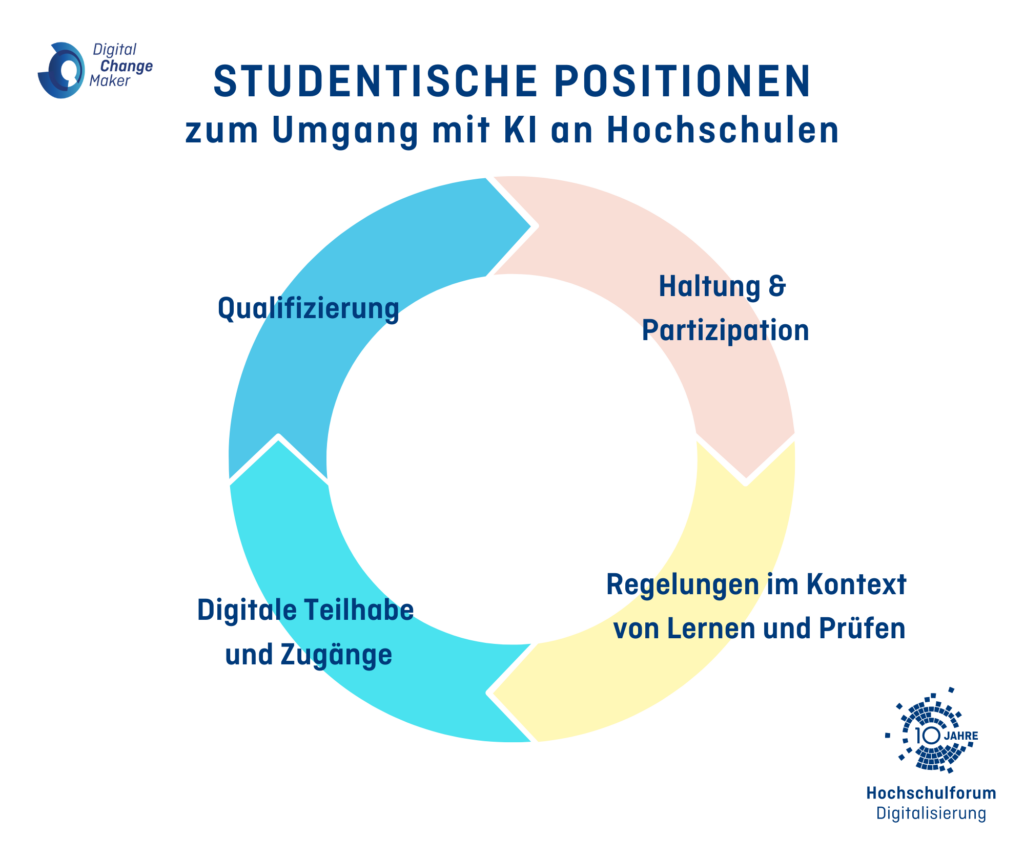DCM x AI-Sprint: Student demands for dealing with AI at universities
Artificial intelligence is drastically transforming the education sector. Universities around the world are grappling with the implications of generative AI for teaching, learning, and assessment.
What is striking is that the discourse is rarely shaped by student perspectives. Instead, there is often speculation about students and their use of AI tools. All too often, students are labeled as “lazy and cheating” for using AI to avoid writing their term papers, and concerns are raised about the potential loss of skills. The fact that AI usage is already a key skill in today’s job market and should not be neglected is often overlooked. The current debate on students’ use of AI and the opportunities and risks associated with AI tools at universities is being conducted in a way that lacks reflection and forward-thinking.
The HFD Innovation Hub aims to enrich this discourse with precisely this missing student perspective by actively involving students. We, six members of the Hochschulforum Digitalisierung’s DigitalChangeMaker working group, are being supported by the HFD team and AI experts from the HFD community to develop our own positions on AI in higher education through the AI Sprint, and to effectively contribute them to the ongoing discourse.
The AI Sprint Process: What Has Happened So Far
Our Positions
AI is once again highlighting structural problems that became apparent during the COVID-19 pandemic, as if under a magnifying glass. Yet too little is changing. To ensure the future viability of universities, we need the courage to address structural changes now. That is why we are first and foremost calling for a change of attitude! As students, we are directly affected by the physical, digital and structural challenges of German universities and the higher education system in our everyday studies. That is why we, as students, are publishing the following positions and demands on four particularly relevant topics to make our voices heard, spark discussion, and initiate change.
We want to engage in dialogue and co-create solutions. Our positions are therefore explicitly not final in terms of content, but represent a work-in-progress: We want to refine and further develop them in collaboration with members of the HFD community and interested parties.
So: feedback, criticism and comments are expressly welcome – we look forward to hearing from you! Please feel free to use the contact form down below.

Position:
Due to the far-reaching implications for universities, the world of work and society, a constructive and progressive attitude towards AI in higher education is absolutely essential. We need a change of attitude — away from viewing AI as something to fear and towards a more constructive and progressive view that understands AI to be an opportunity for transforming universities.
This shift in mindset must be developed across all status groups, firmly established throughout the institution, and sustainably practiced. This requires an open culture of participation at universities, characterized by mutual trust and understanding, that fosters dialogue and collaboration on an equal footing. The goal is to ensure that current questions regarding the implementation of AI, as well as future challenges and opportunities for transforming teaching and learning, are addressed jointly.
There is also a need for low-threshold opportunities for participation, especially for students. From the outset, students should be actively involved in the planning, implementation and evaluation of AI-supported learning formats.
We demand now:
We call on universities to recognize and treat AI as an opportunity and to be guided by the following values when working on regulations, strategies, and teaching and exchange formats:
- Openness: a willingness at all levels to continue learning, to question one’s own role, and to develop it further.
- Community spirit: students and teachers should acquire new knowledge and skills together and learn from each other, shaping changes through continuous exchange.
- Constructiveness: we demand that the discourse not be dominated by pessimism, stagnation, or a deficit mindset towards students, but instead focus on a willingness to change, the development of future-oriented skills, and addressing the needs of students.
In the medium term, we demand:
- We urge university leadership to have the courage to develop and commit to new strategies for the future of AI in higher education.
- We call on academic departments to actively involve students in working groups and to recognize student expertise on AI by inviting them to express critical opinions and share their views on how AI should be handled.
- We call on university leadership and departments to establish spaces for discourse on AI, where students can participate in subject-specific and interdisciplinary task forces. Constructive change requires a culture of mutual trust and understanding, along with an open culture of participation that enables dialogue and collaboration on an equal footing.
Explanation
The current situation among students and faculty regarding AI in higher education is marked by various uncertainties: Students question whether they are “bad students” for using AI and fear facing disadvantages. Faculty, on the other hand, are unsure whether AI tools are relevant to their field, or worry that AI might jeopardize the necessity of their roles (“So, will we no longer be needed?”). These uncertainties lead to confusion, stagnation and long-term disadvantages.
However, AI is here to stay, and it is becoming part of everyday university life. We need to develop a shared discursive stance that overcomes uncertainties on both sides through productive dialogue across all status groups and levels.
We want to be uncertain together, but not remain uncertain together: We aim to encourage and empower students, in particular, to actively contribute their perspectives and expertise on AI to university discourse.
Position
Clear and transparent rules for handling and using AI are needed—especially at the course level—to provide students with clarity and enable the constructive integration of AI in teaching. The rapid developments in AI and their implications for assessment highlight a new urgency and opportunity to establish a competency-oriented assessment culture and to collaboratively revise examination formats at universities, particularly in academic writing.
AI also underscores existing issues in the culture and formats of assessment. As students, we seek examination formats that prioritize learning, foster in-depth engagement, and prepare us for practical application. The increasing use of AI in everyday life further emphasizes this need and offers an opportunity to revise current regulations.
We demand now:
- We call on university leadership to issue a document (e.g., a guideline) informing faculty and students about the scope for using AI in teaching. These regulations should serve as a source of guidance and clarity, rather than restriction.
- We call on university leadership and academic departments to develop a communication strategy that conveys the latest developments and rules to the relevant stakeholders in a clear and targeted manner. It makes sense to publish the regulations transparently and consistently across all communication channels and to facilitate discussions about them.
- We demand that lecturers clearly communicate in each course, at all times and in a centralized location, what AI usage is permitted and how it should be declared.
- We urge lecturers to experiment with AI tools in their seminars and examination formats, within the current legal framework, and to explore their potential.
In the medium term, we demand:
- We call on the Federal Ministry of Education and Research to establish a new funding stream for the development and testing of AI-integrated examination formats or to incorporate this into existing funding programs.
- We call on academic departments and university leadership, in collaboration with students, to revise university-wide and subject-specific examination regulations, ensuring a consistent approach to the use of AI tools in assessments.
- We demand that faculty, in cooperation with students, revise their examination formats in a participatory and learning-outcome-oriented manner within their departments.
Explanation
The current state of AI regulation in higher education is characterized by inconsistency, lack of transparency, or the complete absence of guidelines. The authority to decide on the use of AI often rests with individual instructors, which leads to inconsistent, conservative, or non-existent regulations. This uncertainty negatively affects students. A lack of clarity and direction generates significant insecurity and stifles teaching, learning, and discourse around AI at universities. We, as students, need clear frameworks and guidelines to navigate and rely on.
The rapid advancements in AI and their implications for assessment further highlight the urgent need for a competency-oriented examination culture and a collaborative revision of examination formats at universities, particularly in academic writing. Academic assessments often fail to meet their intended goals and do not test the competencies set out as learning objectives. AI has made these deficiencies even more evident. We desire examination formats that prioritize learning and deep engagement, while preparing us for practical applications.
Position
We need to raise awareness of the barriers that AI can create, as well as explore ways to use AI to minimize existing barriers. Access and qualification are fundamental prerequisites for the use of AI at universities; AI must not lead to disadvantages. On the contrary, AI tools should foster greater autonomy and independence for disadvantaged groups and individuals.
We demand now:
- We call on universities, as well as federal and state governments, to provide free access to AI tools to create a level playing field for students. These tools should comply with data protection guidelines and be accompanied by qualification programs for critical use.
- We demand that universities further expand their workstations and device loan programs so that the use of AI is not dependent on students’ individual access to devices.
- We urge all universities to develop an action plan outlining how AI technologies can be used to mitigate disadvantages (e.g., through subtitling, simplified language, translation, etc.).
In the medium term, we demand:
- We call on universities to systematically enhance equal opportunities and accessibility for all students through AI tools.
- We urge universities to consistently strive for accessible AI, selecting the tools provided based on accessibility criteria and regularly evaluating them for compliance with these standards.
- We call on universities to maintain autonomy in the creation of access opportunities and avoid becoming overly dependent on commercial partners. To support these efforts, we call on federal and state governments to provide adequate financial backing. AI tools should be seen as one of many resources, serving as support rather than a replacement for human interaction.
- We also call on federal and state governments to establish a funding line for participatory AI research involving and supporting disadvantaged groups, ensuring their needs are considered and encouraging their engagement with AI.
Explanation
We regard proficiency in AI as a core competence. If not all students have the opportunity to understand and critically use AI tools during their studies, they will face long-term disadvantages in the (international) job market. Existing inequalities and educational disparities will only be exacerbated by unequal access to AI.
Moreover, AI presents an opportunity to lower the barriers to higher education and enable more people to participate. For example, AI can provide live subtitling during presentations for individuals with hearing impairments or offer real-time translations into simplified or other languages. AI also enables switching between different modalities, such as having texts read aloud, transcribing spoken text, or converting handwritten content into typed text.
Position
Students and instructors must be equipped to navigate a world shaped by data and AI, critically examine these technologies, and actively shape their environments in personal, professional, and civic matters.
This requires the acquisition of skills by all stakeholders—students and instructors alike—regarding the functioning and limitations of AI. This must be achieved through ongoing qualification and education initiatives.
We demand now:
- We demand that universities offer all students the opportunity to take a course on the use of artificial intelligence. Central to this is teaching the fundamentals of AI and its data basis, as well as the critical use and reflection on various tools within the subject context. Given the rapid developments in the AI field, these application courses must be continuously and adaptively updated.
- We urge all instructors to immediately pursue further education on the topic of AI.
- We call on universities to establish (monetary) incentive structures for instructors to encourage participation in AI training and qualification programs.
In the medium term, we demand:
- We call on the federal states to amend their higher education laws to mandate the acquisition of AI skills in all degree programs across Germany.
- We demand that the federal states include continuing education strategies in their target agreements with universities, explicitly incorporating AI training for teaching staff, including the number of participants and the scope of qualification measures.
- We call on universities and academic departments to establish AI transfer offices to serve as contact points and multipliers for teaching development—ideally, one in each department.
- We demand that each department address the impact of AI on the practical application of their subjects and degree programs, and update their curricula accordingly.
- We urge universities to offer all students the opportunity to obtain an additional certificate in AI.
Explanation
Some students adopt a passive stance toward AI, preferring to “have nothing to do with it,” while others use AI uncritically, even allowing it to write assignments for them. Neither of these extremes is productive—we need educational formats where the essential basics of AI are taught with the same rigor as introductory academic courses at the start of a degree program.
A recent study by the CHE shows that the majority of students are dissatisfied with the opportunities to acquire AI-related skills (https://www.che.de/download/check-ki-2024/).
Students:
- Collaborate with other students to identify the status quo of AI use at your university, and reach out to different organizational units: Are there any existing AI guidelines at your university? What regulations do examination offices have for assessments?
- Share your wishes, ideas, suggestions, and criticism with student representatives, and actively encourage them to serve as multipliers.
- Engage in discussions with lecturers about AI and the student perspective.
- Experiment with AI tools as needed, use them, and demonstrate how they can be supportive.
- Make barriers to AI usage in studying and teaching visible.
- For example, consider forming a student AI task force that addresses tasks and roles such as organizing a lecture series, publishing your own positions, opening and claiming discussion spaces, and creating a communication interface with student groups.
Lecturers:
- Be curious and open-minded.
- Actively engage with students to exchange ideas about needs and perspectives, and share expertise.
- Continue to educate yourself on AI.
- Evaluate the use of AI in teaching anonymously.
- Discard any generalized suspicion of cheating through AI use.
- Connect with other lecturers, departments, and institute or faculty leadership to learn about existing teaching and examination guidelines, question them collaboratively, and test examination formats in combination with AI tools.
- Allow and support the use of AI in your courses.
- Seek and utilize further training opportunities provided by the university and public institutions (e.g., AI Campus).
Universities:
- View AI as an opportunity to empower all status groups with future skills.
- Actively create spaces that support the exchange of ideas between different members of the university community.
- Be approachable for both students and lecturers, and proactively invite them to participate in exchange formats.
- Provide free access to AI tools, such as ChatGPT 4.0, for all university members.
- Develop continuing education programs and make them easily accessible for both students and lecturers.
All status groups: get in touch with the DigitalChangeMakers to exchange ideas about content and formats!

Presentation of Our Demands at the University:Future Festival 2024
This is us: The DCMs 2023/24 in the AI sprint

Inga Gostmann
Inga studies Gender Studies (M.A.) at Bielefeld University. They are the student project coordinator for the BiLinked project at the Center for Teaching and Learning at Bielefeld University and also work as a research assistant in the same project, within the Community of Practice “Public Humanities”. As a DigitalChangeMaker, Inga advocates for student-centered approaches, AI, and student mental health.

Lea Hildermeier
Lea studies English and Educational Sciences (B.A.) at Bielefeld University. She works as a tutor at the Center for Teaching and Learning and founded the volunteer university group LiLiGoesMental, through which she advocates for (student) mental health.

Philipp Höhne
Philipp is studying Biological Chemistry (M.Sc.) at TU Berlin. He is particularly interested in AI/digital technologies, internationalization, and digital and hybrid learning concepts.

Gürcan Mustafa Özden
Gürcan studies Medicine at Goethe University Frankfurt. He is particularly interested in student participation, digital and hybrid learning concepts, and equal opportunities.

Kevin Saukel
Kevin studies Educational Sciences and Business Informatics (B.A./B.Sc.) at Goethe University Frankfurt and TH Mittelhessen. He is particularly interested in student participation, accessibility, and educational technologies.

Rosa Steffens
Rosa studies Biochemistry and Molecular Biology (M.Sc.) at the University of Potsdam and works as a student assistant at the Hamburg-based company COLIPI. As a DigitalChangeMaker, she aims to support the integration of AI technologies in teaching and raise awareness of student mental health issues.

Expert in the AI Sprint: Johannes Schleiss
Johannes Schleiss is a doctoral student at the Artificial Intelligence Lab at Otto von Guericke University Magdeburg, where he conducts research on applied and digital training concepts for artificial intelligence (AI) and the use of AI technologies in education.
He is also an Associate Research Fellow at AI Campus, a PrüfungHochDrei Fellow for innovative examination formats, and a Future Scout at the Stifterverband. Additionally, he supports the DigitalChangeMakers of the Hochschulforum Digitalisierung as an expert in the AI Sprint.
Your Message for the DigitalChangeMakers
Share your thoughts with us!
The DigitalChangeMakers welcome your questions, suggestions, comments and requests for cooperation on the AI Sprint and the requirements for dealing with AI at universities.
Contacts in the Hochschulforum Digitalisierung
 Yasmin Djabarian
Yasmin Djabarian
 Lea Bachus
Lea Bachus






